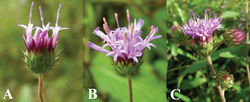Camchaya thailandica
| Notice: | This page is derived from the original publication listed below, whose author(s) should always be credited. Further contributors may edit and improve the content of this page and, consequently, need to be credited as well (see page history). Any assessment of factual correctness requires a careful review of the original article as well as of subsequent contributions.
If you are uncertain whether your planned contribution is correct or not, we suggest that you use the associated discussion page instead of editing the page directly. This page should be cited as follows (rationale):
Citation formats to copy and paste
BibTeX: @article{Bunwong2012PhytoKeys12, RIS/ Endnote: TY - JOUR Wikipedia/ Citizendium: <ref name="Bunwong2012PhytoKeys12">{{Citation See also the citation download page at the journal. |
Ordo: Asterales
Familia: Asteraceae
Genus: Camchaya
Name
Camchaya thailandica Bunwong, Chantar. & S.C.Keeley sp. nov. – Wikispecies link – IPNI link – Pensoft Profile
Type
Thailand. Prov. Udon Thani, rare on rocky areas in Phu Phrabat Historical Park. alt. 300 m, 17°43.84'N; 102°29.65'E, 29 September 2007 (flower) S. Bunwong 328 (holotype KKU, isotype US) (Figures 1–3). Known only from the type collection.
Annual. Inflorescences axillary or terminal, pedunculate. Phyllaries imbricate in 5–6 series, arachnoid-glandular, apices purple. Differs from Camchaya gracilis (Gagnep.) Bunwong & H.Rob. in having ovate acuminate rather than broadly ovate acute phyllaries without margin spines, 10-ribbed rather than 4–5-ribbed achenes, and broadly ovate leaves.
Annual herbs, 50–100 cm tall. Stems erect, rounded, inconspicuously ribbed, scabrous, hairs uniseriate, T-shaped, and glandular. Leaves alternate; petioles to 2 cm long; blades elliptic to oblong, 3–8 by 2–3 cm, chartaceous; bases attenuate, margins serrate, apices acute; both surfaces pubescent, hairs cylindric, T-shaped, and glandular, lateral veins 5–10 pairs. Capitulescences terminal and axillary, corymbose. Capitula pedunculate, involucres broadly campanulate, 5–6 mm diam. Receptacles convex, 2.5–3 mm diam., glabrous. Phyllaries 5–6-seriate, imbricate,light green with purple apices, 7–8 mm long, margins pale, without margin spines, outer surfaces arachnoid-glandular; the outer and the middle ones ovate, apices acuminate; the inner ones lanceolate to oblong, apices acuminate. Florets 50–70; corollas infundibular, purple, pubescent, glands capitate; tubes 6–7 mm long; lobes 2.5–3 mm long. Anthers ca. 2 mm long, bases rounded, apical appendages acute. Styles purple, 6–7 mm long; branches 2–2.5 mm long; sweeping hairs on the outer surfaces reaching below style bifurcation. Achenes obovate, ca. 1.5 mm long, glandular, 10-ribbed, carpopodium absent. Pappus bristles, uniseriate, 1–2 mm long, sometimes absent, deciduous. Pollen echinolophate, 6-porate, without micropuncta.
Distribution
Endemic to Thailand. Only found in Phu Phrabat Historical Park, Udon Thani province.
Ecology
Rocky areas of sandstone hills, scattering in dipterocarp forest, flowering from November and December.
Discussion
Camchaya thailandica is similar to Camchaya gracilis in having ovate phyllaries without spines on the margin, but differs in having 10-ribbed achenes and a broadly ovate leaf shape. Its 6-porate echinolophate pollen is unique to Camchaya (Bunwong and Chantaranothai 2008[1]) and places it firmly in this genus. Additionally, this species has an inconspicuous carpopodium which is common in Camchaya.
Key to the genus CamchayaOriginal Description
- Bunwong, S; Chantaranothai, P; Keeley, S; 2012: A new species of Camchaya (Asteraceae, Vernonieae) from Thailand PhytoKeys, 12: 53-57. doi
Other References
- ↑ Bunwong S, Chantaranothai P (2008) Pollen morphology of the Tribe Vernonieae (Compositae) in Thailand. Natural History Journal of Chulalongkorn University 8: 45-55.
Images
|


